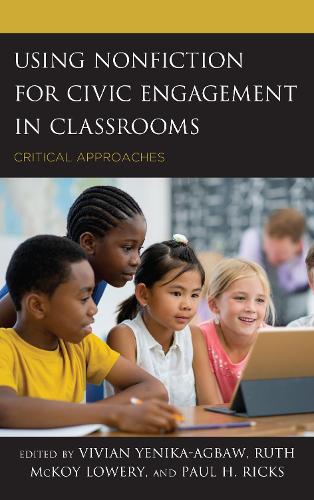
Using Nonfiction for Civic Engagement in Classrooms: Critical Approaches
(Hardback)
Available Formats
Publishing Details
Using Nonfiction for Civic Engagement in Classrooms: Critical Approaches
By (Author) Vivian Yenika-Agbaw
Edited by Ruth McKoy Lowery
Edited by Paul H. Ricks
Bloomsbury Publishing PLC
Rowman & Littlefield Publishers
28th February 2018
United States
Classifications
Professional and Scholarly
Non Fiction
370.115
Physical Properties
Hardback
148
Width 157mm, Height 239mm, Spine 18mm
413g
Description
This book acknowledges the existence of high quality nonfiction childrens literature that may serve as a basis for conversation about civic engagements and our roles as global citizens. It touches on our social history, and offers ideas for how educators might be able to engage readers in healthy and useful dialogues on what it means to be human and how nonfiction texts attempt to reconstruct this reality in this quest to recognize our collective humanity.
Reviews
Factsor alternative facts. Now is an era when critical reading of nonfiction texts is vitally important, a need which this timely volume addresses. Its nine chapters focus on some of the most pressing issues of our timeracism, immigration, bullyingframed by critical lenses and demonstrated through teaching examples and current, noteworthy nonfiction titles. A new important resource for both classroom practitioners and teacher educators who empower students to strive for social justice! -- Barbara Lehman, professor emeritus, The Ohio State University
Reading this book feels like participating in a seminar in social justice literature. The authors present a wide variety of voices that make readers eager to dive into the examined texts. Chapter by chapter, readers will gain inspiration and courage to modify their teaching. Classroom by classroom, this book will help change the world. -- Janet Wong, co-author, HERE WE GO: A Poetry Friday Power Book
This book is a timely, much-needed resource for teachers who seek to engage their students in examining the issues of equality and power that we all face in today's complex and interconnected world. Using nonfiction literature as a springboard, teachers can tap into the examples and strategies provided to promote critical inquiry and dialogue in the safe space of their classrooms. The authors show teachers how to spur students to dig deeper into a wide range of social justice topics, using a problem-posing stance to investigate point-of-view, subjectivity, and accuracy of nonfiction literature. -- Gail V. Ritchie, PhD, National Board Certified Teacher, retired instructional coach, Fairfax County Public Schools
Author Bio
Vivian Yenika-Agbaw is professor of childrens literature and literacy at The Pennsylvania State University, University Park. She teaches courses on childrens and adolescent literature. Ruth McKoy Lowery is professor of literacy and associate chair of the Department of Teaching and Learning at The Ohio State University. She teaches courses on children's literature and literacy education. Paul H. Ricks is a doctoral candidate in Curriculum and Instruction at The Pennsylvania State University, where he currently teaches childrens literature courses.
